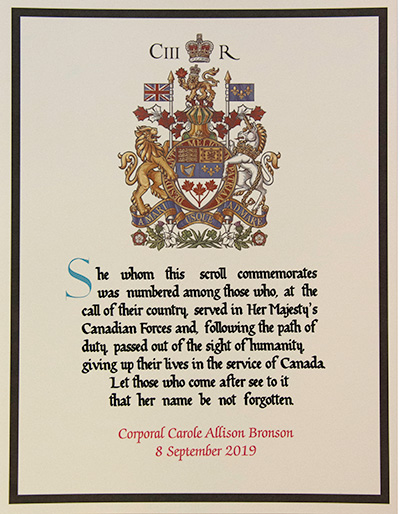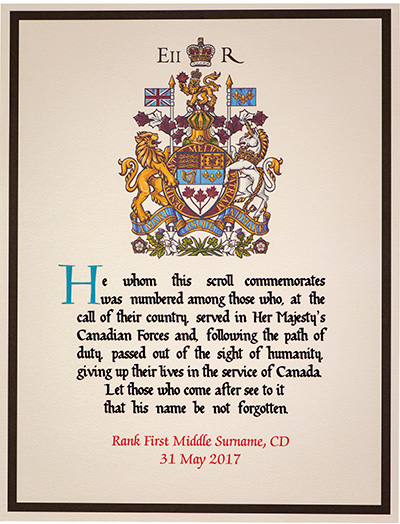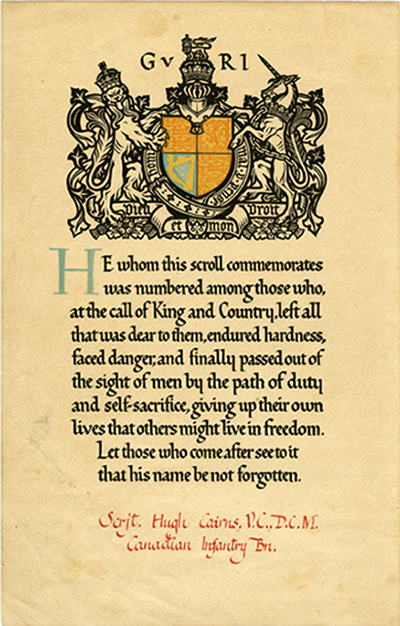Memorial Scroll
The official description, eligibility, criteria, and history of the Memorial Scroll.

Context
The Memorial Scroll is presented by His Majesty’s Canadian Government to commemorate the sacrifice of military personnel who lay down their lives for their country.
Eligibility et criteria
To be eligible, a CF member must have served in the Regular Force, Primary Reserve, Cadet Instructor Cadre, or Canadian Rangers after 6 October 2001.
The Memorial Scroll is issued to commemorate the death of a member of the Canadian Forces as a result of an injury or disease related to military service and which has occurred on or after 7 October 2001.
One Scroll is issued for every eligible death and is presented to the beneficiary of the estate of the deceased (usually the person who will inherit the deceased’s medals).
When the death is clearly attributable to service such as in the case of direct hostile action, accidents while on training, etc., the Scroll will be issued immediately. When the death is not clearly and undeniably attributable to service, such as in the case of natural deaths while at work (heart attack, stroke, etc.), fatal illnesses, suicides, etc., the Scroll will not be issued until the Department of Veterans Affairs has made an official determination regarding the cause of death. In these cases, a delay of several months is to be expected.
Because the Scroll was reintroduced in January of 2009, the Scrolls for deaths which occurred between the start of eligibility and 2009 will be presented to the eligible recipients at the earliest opportunity — either on the occasion of other presentations, such as for the Sacrifice Medal or additional Memorial Crosses where applicable — or on a separate occasion. The wishes of the beneficiary will be respected to the greatest possible extent. For current deaths, the Scroll will be presented, whenever possible, to the beneficiary before the funeral when the Memorial Bar, Memorial Crosses, and any service medals the deceased may be entitled to will be presented.
Description
A cream-coloured scroll, 21.5 cm by 27.9 cm, having a black border and bearing on its superior part the Royal Arms of Canada in full colour with the Royal Cypher displayed in black on either side of the Crown and, below, the following inscription:
He whom this scroll commemorates was
numbered among those who, at the
call of their country, served in His Majesty’s
Canadian Forces and, following the path of
duty, passed out of the sight of humanity,
giving up their lives in the service of Canada.
Let those who come after see to it
that his name be not forgotten.or
She whom this scroll commemorates was
numbered among those who, at the
call of their country, served in His Majesty’s
Canadian Forces and, following the path of
duty, passed out of the sight of humanity,
giving up their lives in the service of Canada.
Let those who come after see to it
that her name be not forgotten.
The substantive rank at time of death, given names, last name, postnominals (where applicable), and date of death of the person commemorated appear printed in deep red below the inscription. The scroll is produced in the first official language of the fallen.
The Scroll is presented in a black leatherette folder bearing the Royal Arms of Canada impressed in gold on the cover.
Bar(s)
Not applicable
Wearing
Not applicable
Postnominals
Not applicable


Historical notes
The current Memorial Scroll was introduced in January 2009 (retroactive to 7 October 2001), but it is in fact the restoration of an old tradition. In the summer of 1916, in the middle of the First World War, which saw unprecedented numbers of casualties, discussion arose in the British House of Commons and then in the military hierarchy regarding some form of recognition for the families of the fallen. After careful consideration by various committees, it was decided the memorial should take the form of a bronze Plaque accompanied by a Scroll. King George V approved the proposal in March 1918 and distribution of the Scroll begun in June 1919. Because of delays, the Plaque only became available later. These memorials were distributed to the next-of-kin of all members of His Majesty’s Forces (including the Canadians) who died on active service between 4 August 1914 and the end of the War. By 1925, over 1,150,000 Plaques and Scrolls had been issued.
During the Second World War, the idea of a similar program was raised as early as September 1939. After committee work and many delays, it was decided to postpone a decision until the end of the War. As a result of the issue being raised in the British House of Commons a few days after VE-Day, the proposal was revived and after further delays, it was decided to proceed with the Scroll alone in 1947. It would appear however that the Canadian Government decided not to avail itself of this program but issued its Memorial Cross along with the Memorial Bar for this conflict.
In 1955, The British Government created another Scroll for those who had died in Korea, and some Commonwealth countries did participate in this program, but again, Canada decided to only issue the Memorial Cross and the usual letter of condolence.
With the campaign in Afghanistan and following recent changes to the Memorial Cross and the creation of the Sacrifice Medal, it was thought appropriate to take this opportunity to restore the tradition of the Memorial Scroll in Canada to complete our Memorial package so it now forms a more comprehensive expression of the nation’s appreciation and sympathy for the families of our fallen.
The modern Scroll is directly inspired, in text and form, from its predecessors so that it meets our current requirements while respecting a dignified and formal appearance.
The Directorate of Honours and Recognition of the Department of National Defence is responsible for the administration of the Memorial Scroll.